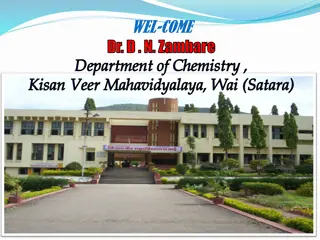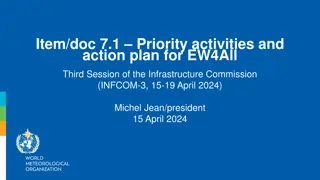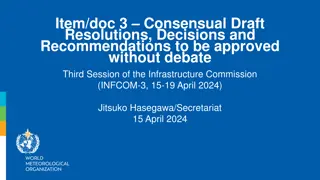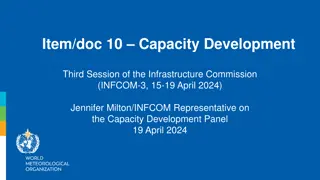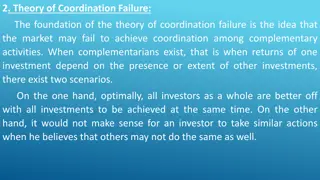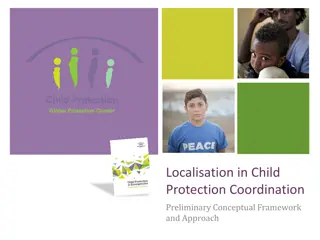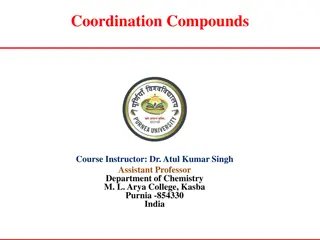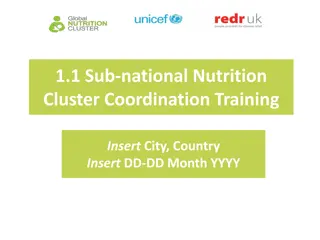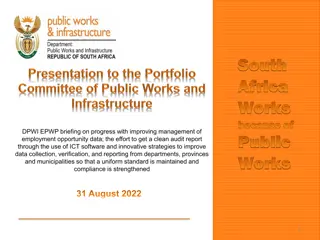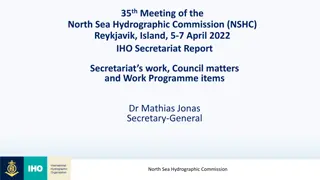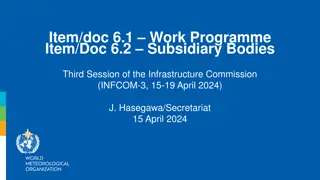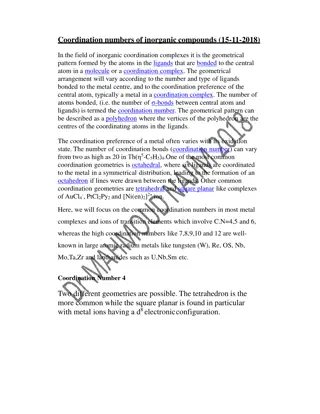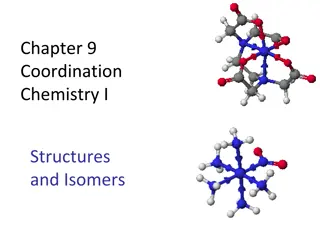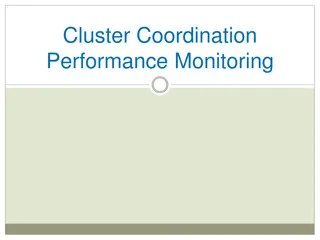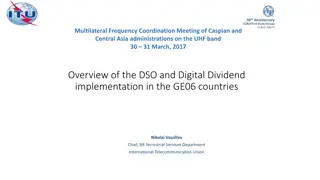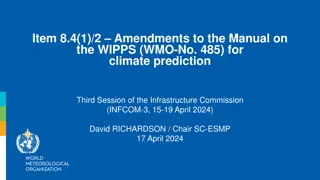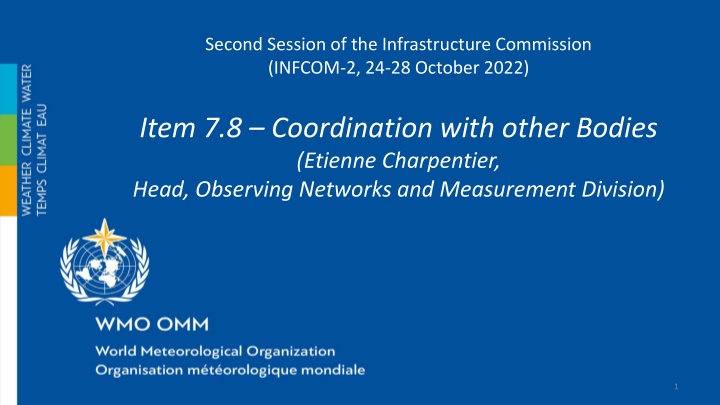
Infrastructure Commission Coordination with Other Bodies
"Explore the critical importance of coordination with other bodies in the Infrastructure Commission for consensus on various cross-cutting issues and collaboration with regional associations and technical committees for effective decision-making. Resolution 35 by the WMO Executive Council emphasizes the establishment of the Technical Coordination Committee. Requested evaluations aim to enhance existing coordination approaches and mechanisms. Discover more insights from the second session of the Infrastructure Commission. "
Download Presentation

Please find below an Image/Link to download the presentation.
The content on the website is provided AS IS for your information and personal use only. It may not be sold, licensed, or shared on other websites without obtaining consent from the author. If you encounter any issues during the download, it is possible that the publisher has removed the file from their server.
You are allowed to download the files provided on this website for personal or commercial use, subject to the condition that they are used lawfully. All files are the property of their respective owners.
The content on the website is provided AS IS for your information and personal use only. It may not be sold, licensed, or shared on other websites without obtaining consent from the author.
E N D
Presentation Transcript
Second Session of the Infrastructure Commission (INFCOM-2, 24-28 October 2022) Item 7.8 Coordination with other Bodies (Etienne Charpentier, Head, Observing Networks and Measurement Division) 1
Coordination with other bodies is critical for reaching consensus on critical cross cutting issues e.g. More specific cross cutting issues e.g. Generic cross cutting issues e.g. Review of implementation of WMO Strategic Plan Capacity Development Strategy, ETR products Technical Regulations and Guidance material Improving gender and regional balance Business Continuity and Contingency Planning Public-Private Engagement Decision-support systems for risk & impact- based forecasting GFCS, seasonal forecasts & regional climate products WMO Unified Data Policy Global Basic Observing System (GBON) GDPFS and its evolution of to the Seamless GDPFS Polar and high-mountain regions focus WMO-IOC Collaborative Strategy WMO Vision and Strategy for Hydrology and its associated Plan of Action
Technical Coordination Committee Resolution 35 (EC-70) Feedback and tasks Review of consistency of technical regulatory framework, compliance, risk assessment, user needs, research to operation Technical recommendations Infrastructure Commission Consolidated analytical input on technical recommendations for EC consideration Services Commission Technical Coordination Committee Executive Council Research Board Collaboration and coordination between the technical bodies and regional associations, including regional priorities and requirements JCB, SAP PAC CCP, HCP, PHORS, CDP Regional associations (RA I, II, III, IV, V, VI) Feedback and tasks
Coordination with other bodies Resolution 35 (EC-70) WMO Executive Council structures highlighted the different roles of WMO bodies and established inter alia the Technical Coordination Committee (TCC) Since its establishment, INFCOM entertained collaborations with other Bodies Regional Associations SERCOM Research Board EC Panels (e.g. CCP, CDP, HCP) Joint WMO-IOC Collaborative Board HMEI, ICAO, IOC of UNESCO See P/INFCOM report (INFCOM-2/Doc 2)
Decision 11 (INFCOM-1) Requested P/INFCOM in consultation with P/SERCOM to provide to TCC a joint technical commission evaluation on the effectiveness of existing coordination approaches and mechanisms for the delivery of the adopted work programme, with recommended changes for their consideration
TCC Report to EC-75 (1/2) See EC-75 INF 2.5(2) TCC noted the need For Regional WIGOS Centres: To ensure consistent capacity development efforts, including specific training in WMO languages & horizontal cooperation activities To identify experts & train potential trainers in the region To increase coordination among technical experts to provide technical assistance to Members To ensure consistent capacity-building to implement the CAP in Latin America through project-based initiatives To raise awareness on the usefulness of the tool and carry out regional activities coordinated with other partners such as the United Nations Office for Disaster Risk Reduction (UNDRR)
TCC Report to EC-75 (2/2) See EC-75 INF 2.5(2) TCC also noted: The need to encourage intraregional cooperation for the training of trainers and The need to complete the international Register of Alerting Authorities Initiatives implemented in RA IV in developing MHEWS that provide early and actionable information to protect lives, assets and livelihoods and are a critical requirement for dealing with shocks caused by hydrometeorological, seismic, environmental or health- related events
Selected key initiatives and coverage of Strategic Objectives Lead/Requester Contributing/requested of contribution Requested of review SERCOM SO Initiative INFCOM PHORS RA VI RA IV RA III RA V RA II CCP HCP CDP PAC JCB RA I RB 1.1 MHEWS [RA VI GMAS & MHEWSs] 1.2 Climate GFCS 1.2 Climate Seasonal forecasts & tailored sub-regional products 1.3 Hydrology Plan of Action for Hydrology 1.4 Weather Risk- and impact-based forecasting DSS 2.1 Observation GBON 2.2 Data Unified Data Policy 2.3 Forecasting GDPFS requirements 3.1 Sc. knowledge [RA I research needs] [RA VI R&D Strategy] 3.2 Sc. services 3.3 Sc. policy 4.1 Needs Capacity Development Strategy 4.2 Ed.& Training Revision of Basic Instruction Package 4.2 Ed.& Training [RA I CD climate science, maritime weather, hydr.] 4.3 Partnerships 5.1 Governance Strategic Plan Crosscutting WMO-IOC Collaborative Strategy Crosscutting Polar and High-Mountain focus 5.2 Programmes 5.3 Inclusiveness Expanded involvement of experts from RAs 5.3 Inclusiveness Interpretation at meetings; translation of documents
Some common concerns of Regional Associations as noted by TCC The plans of TCs, the RB and other technical bodies should reflect and be aligned with the needs and priorities detailed in the plans and strategies of Ras Requires cross sharing of information and systematic review process Strengthened coordination at the level of experts and chairs of subsidiary bodies of TCs & RAs is needed, with the support of the technical coordinators of regional offices and reciprocity of invitations to meetings of the management groups The presidents of TCs should consult with the presidents of RAs on the balance of TC experts across WMO regions The Members represented on the TCs currently are less than 55% of the whole membership of the Organization RAs to promote nomination of experts into TC working structure
Some common concerns of Regional Associations as noted by TCC Language barriers in some regions preventing equal opportunities for experts to fully participate in activities of TCs Assure translation of documents & interpretation of meetings Ensure translation & active dissemination of language versions of the mandatory publications per Resolution 81 (Cg-18) Number of NMHSs capable to produce global data and forecasting products is limited Facilitate access, incl. through GDPFS Web Portal Need to facilitate coordination among RAs on issues of common concern Establish a forum of the presidents of regional associations Need to strenghthen overall coordination between the technical departments in the Secretariat/Geneva & the regional offices Use the regional coordinators Coordinate between the Secretariat and the TCs Establish approaches and tools for Members to better report on compliance with tech. regs. & to assess impacts & risks associated with the introduction of new standards
Conclusion in accordance with approach proposed by TCC Significant amount of coordination among bodies taking place on a regular basis through periodic meetings & cross-representation TCC focusing on added value of coordination on higher-level & cross- cutting issues Each EC panel and the JCB reporting to TCC on their activities & interactions with partners, and submitting proposals incl. jointly with partners, to the Executive Council Need to address the recommendations of TCC, including the concerns of the regional associations See also Draft Decision 7.9/1 (INFCOM-2) on the Engagement with the Regional Associations, and the proposed consultative mechanism
Thank you 12

